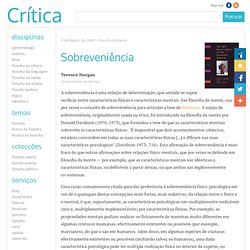

The 7 Fatal Flaws of Thinking — and How to Fix Them. It's no secret that the world around us is getting increasingly complex, and is moving faster than ever before.
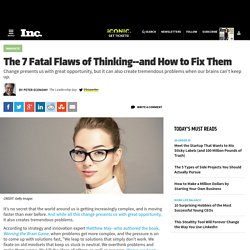
And while all this change presents us with great opportunity, it also creates tremendous problems. According to strategy and innovation expert Matthew May--who authored the book, Winning the Brain Game, when problems get more complex, and the pressure is on to come up with solutions fast, "We leap to solutions that simply don't work. We fixate on old mindsets that keep us stuck in neutral.
Scientists have put a worm’s brain into a Lego robot’s body - and it works. More than four centuries ago, the Capuchin Monastery (or Catacombe dei Cappuccini) in Palermo, Sicily, ran out of room in its little garden cemetery, so the monks spent many years excavating catacombs below the building for extra storage.

The first body to be placed down there was brother Silvestro of Gubbio, who was mummified in 1599, washed in vinegar and put back in his robes. While for the first couple of centuries, these catacombs were reserved exclusively for deceased monks, eventually they became open to every dead person - of a certain status. The elite few who found a place in the subterranean tombs would often stipulate in their wills which outfits they’d be displayed in, and whether or not these clothes be updated on a regular basis.
The upkeep of the catacombs was funded by relatives concerned about keeping the remains of their loved ones pristine. "During a recent visit, I found myself wondering what it was about these mummies that made them so eerie. According to A. Consciousness on-off switch discovered deep in brain - life - 02 July 2014. Read full article Continue reading page |1|2 ONE moment you're conscious, the next you're not.
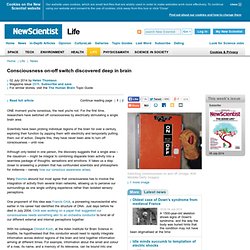
For the first time, researchers have switched off consciousness by electrically stimulating a single brain area. Scientists have been probing individual regions of the brain for over a century, exploring their function by zapping them with electricity and temporarily putting them out of action. Despite this, they have never been able to turn off consciousness – until now. Although only tested in one person, the discovery suggests that a single area – the claustrum – might be integral to combining disparate brain activity into a seamless package of thoughts, sensations and emotions.
Many theories abound but most agree that consciousness has to involve the integration of activity from several brain networks, allowing us to perceive our surroundings as one single unifying experience rather than isolated sensory perceptions. Teoria fisicalista. Physical. David Papineau. David Papineau (born 1947) is an academic philosopher.
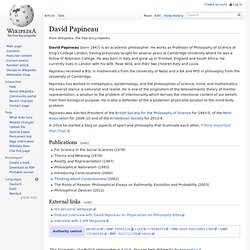
He works as Professor of Philosophy of Science at King's College London, having previously taught for several years at Cambridge University where he was a fellow of Robinson College. He was born in Italy and grew up in Trinidad, England and South Africa. He currently lives in London with his wife, Rose Wild, and their two children Katy and Louis. Papineau received a BSc in mathematics from the University of Natal and a BA and PhD in philosophy from the University of Cambridge. Papineau has worked in metaphysics, epistemology, and the philosophies of science, mind, and mathematics. Papineau was elected President of the British Society for the Philosophy of Science for 1993-5, of the Mind Association for 2009–10 and of the Aristotelian Society for 2013-4. Donald Davidson (philosopher) Although published mostly in the form of short, terse essays which do not explicitly rely on any overriding theory, his work is nonetheless noted for a highly unified character—the same methods and ideas are brought to bear on a host of apparently unrelated problems—and for synthesizing the work of a great number of other philosophers.
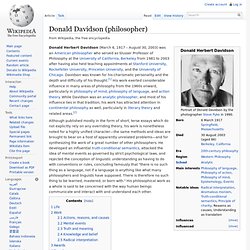
He developed an influential truth-conditional semantics, attacked the idea of mental events as governed by strict psychological laws, and rejected the conception of linguistic understanding as having to do with conventions or rules, concluding famously that "there is no such thing as a language, not if a language is anything like what many philosophers and linguists have supposed. There is therefore no such thing to be learned, mastered, or born with. " His philosophical work as a whole is said to be concerned with the way human beings communicate and interact with and understand each other. Under the influence of W.
V.
Functionalism. 1.
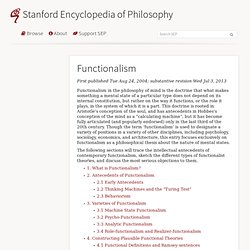
Jeff Hawkins: How brain science will change computing. Dan Dennett: The illusion of consciousness. John Searle: Our shared condition. David Chalmers: How do you explain consciousness? Problema mente-corpo. Dualismo. Moral Responsibility and Determinism: The Cognitive Science of Folk Intuitions. Compatibilismo (livre-arbítrio e determinismo) Origem: Wikipédia, a enciclopédia livre.
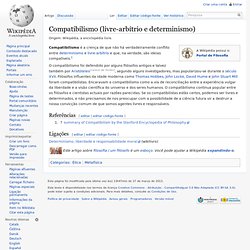
Compatibilismo é a crença de que não há verdadeiramente conflito entre determinismo e livre-arbítrio e que, na verdade, são ideias compatíveis.[1] O compatibilismo foi defendido por alguns filósofos antigos e talvez também por Aristóteles[carece de fontes], segundo alguns investigadores, mas popularizou-se durante o século XVII. Filósofos influentes da idade moderna como Thomas Hobbes, John Locke, David Hume e John Stuart Mill foram compatibilistas.
Donald Davidson - Conhecer a Própria Mente. Conhecer a própria mente. Como é ser um morcego? Thomas Nagel Universidade de Nova Iorque Tradução de Luís M.

S. Augusto A consciência é o que faz do problema da relação mente-corpo um problema verdadeiramente intratável. Todos os reducionistas têm a sua analogia favorita na ciência moderna. Este facto levou ao acolhimento de descrições implausíveis do mental, em grande medida porque elas permitiam tipos já conhecidos de reducionismo. A experiência consciente é um fenómeno amplamente difundido. Podemos chamar a isto o carácter subjectivo da experiência. Embora uma teoria do substrato físico da mente tenha que explicar muitas coisas, esta parece ser a mais difícil de explicar.
Filosofia da mente.
Acervo em Português. Epifenomenalismo - Filosofia da Mente - Laifi. Epifenomenalismo. Filosofia da Mente. Sobreveniência. Thomas Mautner Universidade Nacional da Austrália A sobreveniência é uma relação de dependência entre propriedades em níveis diferentes, que não é lógica nem causal.
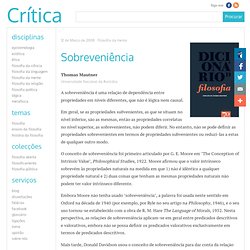
Sobreveniência. Terence Horgan.
